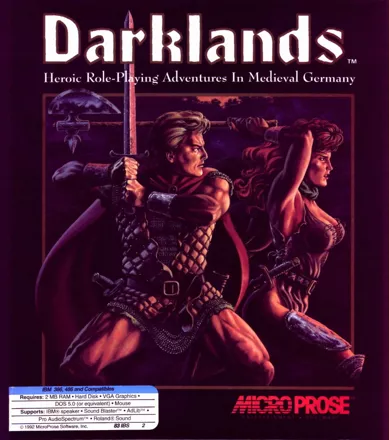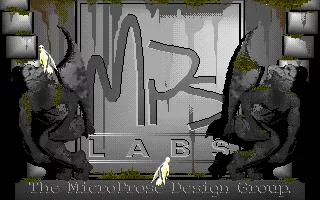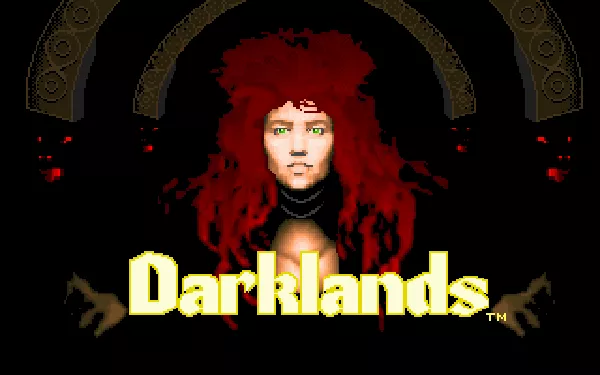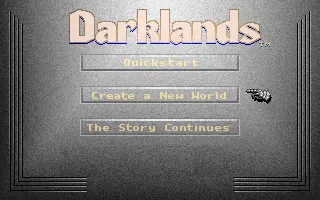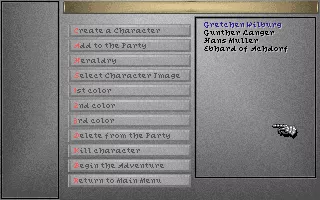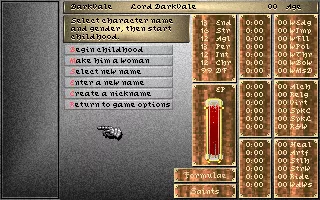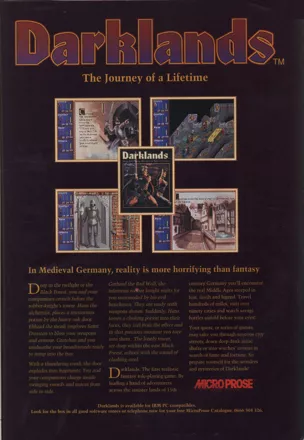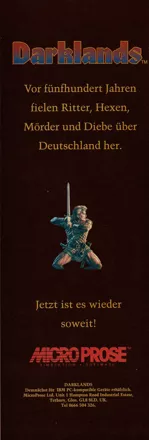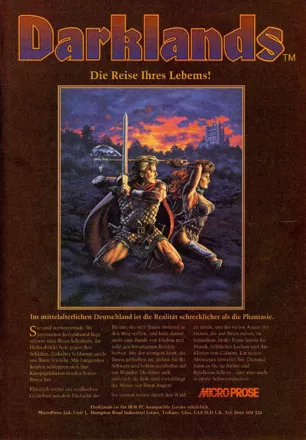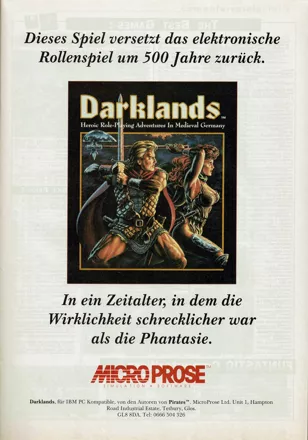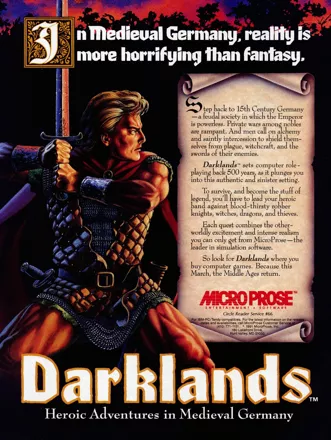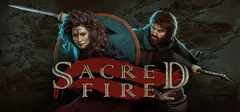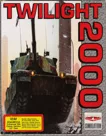Darklands
Description official descriptions
Darklands is a role-playing game set in 15th century Holy Roman Empire, which at that time encompassed today's Germany and several surrounding countries. Unlike most other role-playing games, it is set in a concrete historical environment that is accurately depicted, including geographical outlines, social and cultural backgrounds, authentic establishments and items, and so on. The game's supernatural elements are strictly based on the popular beliefs of that time and region and include fantastic creatures such as kobolds or dragons, curses, witchcraft, alchemy that actually works, etc.
The player controls a party of four active characters, though any amount of them can be created and swapped in the town inns. The player can begin by either selecting a pre-made party (quickstart) or by creating their own characters. In the beginning the player selects the character's social background. Afterwards, when they are ten years old, the player can choose an initial career path for them. Careers may include diverse occupations such as soldier, peasant, bandit, etc., which may eventually become more specialized (e.g. a student turning into an alchemist).
The more time the player invests in a certain career path (in five year periods), the more experience points the character receives, which can be manually allocated to improve their skills. Career choices affect main attributes such as strength or charisma, as well as skills, which involve weapon proficiencies, stealth, virtue, speaking Latin, healing, riding, and many others. Though there are no class definitions and each character can theoretically achieve excellence in any skill, character builds in the game can be seen as warriors, clerics, and alchemists. Religion-oriented characters may learn about various saints during the course of the game and pray to them for different benefits. Alchemists gain access to formulae and have to procure ingredients to mix potions with various effects. Skills in the game increase through repeated use: using swords in combat may increase the edged weapon skill, successfully conducted conversation may increase the character's common speech skill, etc.
The party chosen by the player begins the adventure in the inn of a randomly chosen town. The main plot eventually involves confronting a powerful demon and its cult, but it is unraveled only under specific circumstances achieved in the game. The game has a vast scope and can go on indefinitely. However, characters would age, grow weaker, and eventually die, requiring the player to create new ones. The main goal is to collect as much fame for the party as possible to obtain higher-ranked quests with better rewards, which also includes the quest that leads to the completion of the main plot. The player is completely free to roam the vast map of the Empire, accessing towns, castles, villages, and other places of interest. Towns and castles are navigated via text menus, with background images representing various locations. The travel screen is a map of the Empire with a lone figure representing the player-controlled party.
Most settlements of the same type have nearly identical options, though actual results may vary depending on the characters' skills, their local reputation, as well as unique traits found in different locations. For example, different towns may have wares of vastly different quality for sale; villages may engage in devil worship, and the player may attempt to prove that, etc. It is possible to increase local reputation (for example, by taking on cutthroats bothering the citizens) and overall fame by making virtue-increasing choices and vanquishing foes. It is, however, also possible to become outlaws by attacking guards, killing priests on the roads, and so on.
The game has several large isometric dungeon-type areas, most notably mines of different types, which contain generic quests as well as puzzles to solve. Areas unique to the main plot are also built like dungeons with particularly dangerous enemies and treasure to loot. However, much of the activity in the game takes place either in towns or in the wilderness, through various types of random encounters. The player is always given the option to avoid combat either through diplomacy or other means, the success depending on the character's corresponding attributes.
Combat takes place on separate isometric screens and proceeds in real time, but the player can pause the action to give orders to the characters at any time, giving it a pseudo-turn-based flavor. Characters can be ordered to attack, search for the enemies' vulnerable spots, use items, etc. Different types of weapons may have different effects depending on the enemies' armor: for example, blunt weapons are more effective against plate armor than swords. Depending on the enemies' intentions, player-controlled characters may only be knocked down or wounded mortally in case of defeat. Dead characters can not be brought back to life and must be replaced with new ones.
Groups +
Screenshots
Promos
Videos
See any errors or missing info for this game?
You can submit a correction, contribute trivia, add to a game group, add a related site or alternate title.
Credits (DOS version)
36 People · View all
| Original Concept | |
| Project Leader | |
| Design | |
| Programming | |
| Music / Sound Programming | |
| Graphics / Artwork | |
| Music | |
| Art Director | |
| Packaging | |
| Documentation | |
| [ full credits ] | |
Reviews
Critics
Average score: 78% (based on 16 ratings)
Players
Average score: 3.8 out of 5 (based on 62 ratings with 8 reviews)
One of, if not the only the greatest CRPGs made
The Good
This game is nearly perfect, it never gets old. After you beat the game, you can still wander around in the world (hundreds of subquests, you'll probably miss a few along the way). I bought the game back in 1995 and am still playing it today. The historical background is excellent, instead of magic there is alchemy which eliminates the "prevent the evil wizard from taking over the world" plotline most RPGs have. The character creation screen is the neatest I have seen in any RPG, you choose what kind of family they had, some professions your character could have had, and then add your skills points. The characters age realisticly, there are day/night cycles, shops close at certain times... This game will always stand out from any other RPG I've played in terms of gameplay.
The Bad
A few minor bugs, such as getting trapped in some dungeons interfered with my games a few times. The save/load functions needed work, I had to date and timestamp my save games to easily understand which one was the last. It dates them for you, but sometimes it's easier to read yesterday's date instead of the date a couple centuries ago. I've always hoped that MicroProse would make a special edition version with more enhanced graphics, and a map/scenario editor... still haven't gotten it though.
The Bottom Line
If you prefer gameplay over OpenGL 3D graphics, Darklands is for you. If you're looking for a game you'll enjoy for 5+ years, Darklands is for you. If you like RPGs I highly recommend you try Darklands.
DOS · by ZombieDepot (40) · 2001
The Good
The game just oozes atmosphere, I love the whole medieval setting and the fact most of the graphics are stills means the age of the game doesnt show too much. The character creation system is great and you can really get quite attached to the little blighters as they develop in stature and fame. This open ended premise basically means you can create your own story rather than be lead along like in the Final Fantasy series.
The Bad
The graphics are dated as are the sounds, but as I said they really dont detract from the whole experience. The open ended nature can get a bit tiresome without enough focus as generally repeating the same actions will reap the most benefits.
The Bottom Line
A classic RPG worth checking out if your a casual player ESSENTIAL if you are an RPG fan.
DOS · by Hugh McKenna (4) · 2001
The Good
The game is trying to be as realistic as possible in some critical areas no other game did before.
Character creation and experience system has no class limitations - any character can train any skills and do anything. There are no character prototypes you need to stick to. This is something no AD&D licence game can achieve, very fresh approach.
There are no magic and cleric spells, but alchemy and saints. Another new idea. And it works well. Due to the great game engine you can use them in almost every place to solve problems.
Lots of varying sub-plots gives much to play.
Music is guite good, giving a nice atmosphere, added to nice pastel colour pictures.
The Hint Book, which just can't be found anywhere anymore, gives loads of information about everything that goes inside the game. It tells you e.g. what each saint gives, stats for equipment and what facilities each city has. With this book you could almost run conventional face-to-face RPG campaigns!
The Bad
Only a few things to complain.
Going through all the screens over and over gets quite frustrating in a while. Especially as that gives a feeling that every city is similar.
Also, due to the unlimited nature of the game, it contains numerous bugs corrected mostly by many patches.
And the game was huge sized at the time, taking about 20 MB to install and installing from over 10 floppys. Plus applying the patches. Installing it was a lengthy process.
The Bottom Line
One of the best computer RPGs ever created. Very free character developement system added to huge game area gives you much freedom and hours and hours of playtime.
DOS · by Shogun (3) · 1999
Discussion
| Subject | By | Date |
|---|---|---|
| Uh-oh... | Unicorn Lynx (181780) | Sep 9, 2013 |
| Wrong Platforms? | Señorita Kathryn (615) | Mar 5, 2012 |
Trivia
Cancelled Amiga version
An Amiga version of Darklands was considered, but the game was judged as too large to be played from floppy, and the potential market of hard-disk equipped Amigas was apparently deemed not large enough, going by a chat log with Arnold Hendrick.
Influence
Darklands is based on history (whether true or not) of the influence of the Templar Knights, a powerful monastic order during the crusades which were eventually crushed by the Church (Pope Clement V) and the King of France (King Philip IV) based on their allegations with Satan, specifically Baphomet.
Intended Sequels
From the Designer's Notes in the Game Manual: "Darklands was designed to permit sequels. It is possible to have some additional adventures in Germany. More importantly, it is possible to create entirely new games elsewhere in Europe. The system not only allows moving "saved game" files back and forth, but also allows you to load multiple games onto your hard disk and move back and forth between the nations, in a sort of giant adventure. Let us know what you enjoyed in Darklands, what you would like to see in a sequel, and what setting you prefer. There are plenty of possibilities: the Emperor in Germany has many political problems and intrigues, England and France are busy finishing the last half of the Hundred Years War, after which England falls into civil war (the War of the Roses). Meanwhile, Italy is at the peak of its warring city-states era, Vlad the Impaler appears in the Balkans (the historical figure who ultimately became Dracula), Tamerlane is conquering Central Asia, and much more.What's your preference?" ~ Arnold Hendrick, 1992.
Sadly, they must not have received enough feedback to pursue this any further.
Memory
The game needs over 600K of free DOS memory to avoid crashes. In fact, the MORE lower memory you can free up, the better the game runs, something that is barely addressed by all the later patches.
Awards
- Computer Gaming World
- November 1996 (15th anniversary issue) – #10 Least Rewarding Ending of All Time
Information also contributed by Игги Друге and Indra was here
Analytics
Upgrade to MobyPro to view research rankings!
Related Sites +
-
Darklands - FAQs & Guides
Walkthroughs and other files relating to Darklands -
Darklands Interview with Arnold Hendrick
Transcript of a GEnie real-time conference which appears to have taken place soon after the release of Darklands. -
Matt Chat 78
Video interview with Arnold Hendrick with the main subject Darklands (Part 1/3) -
The Darklands Domain
Resources for players of Darklands, by MicroProse. An extremely comphrehensive site.
Identifiers +
Contribute
Are you familiar with this game? Help document and preserve this entry in video game history! If your contribution is approved, you will earn points and be credited as a contributor.
Contributors to this Entry
Game added by Brian Rubin.
Windows added by Picard. Macintosh, Linux added by Sciere.
Additional contributors: Trixter, Kasey Chang, Indra was here, Jeanne, Glen Henderson, formercontrib, Patrick Bregger.
Game added August 30, 1999. Last modified March 6, 2024.
